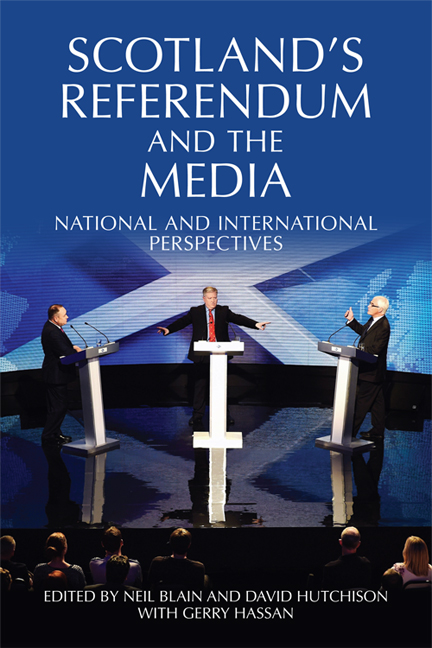Book contents
- Frontmatter
- Contents
- Preface
- Part One The Referendum in Scotland
- Part Two Views from the UK
- 9 English Television News Coverage of the Scottish Referendum
- 10 The English Press and the Referendum
- 11 Wales, Devolution and the Scottish Independence Debate
- 12 Our Friends Across the Water: Northern Ireland Media Coverage of the Scottish Independence Referendum
- Part Three International Perspectives
- Notes on the Contributors
- Index
10 - The English Press and the Referendum
from Part Two - Views from the UK
Published online by Cambridge University Press: 05 August 2016
- Frontmatter
- Contents
- Preface
- Part One The Referendum in Scotland
- Part Two Views from the UK
- 9 English Television News Coverage of the Scottish Referendum
- 10 The English Press and the Referendum
- 11 Wales, Devolution and the Scottish Independence Debate
- 12 Our Friends Across the Water: Northern Ireland Media Coverage of the Scottish Independence Referendum
- Part Three International Perspectives
- Notes on the Contributors
- Index
Summary
Our concern in this chapter is with the coverage of the Scottish referendum (and that very phrase is indicative of its perception south of the border) in the English press. In any routine assessment of media reporting of a political contest, most commonly in elections, the obvious question to ask is ‘so who did they support or favour?’ This would be followed by claims and counter-claims about the importance and success of any such support in achieving the desired political result. The Sun's infamous claim in April 1992 (after the UK general election) that it was ‘The Sun Wot Won It’, a triumphalist verdict regularly disputed afterwards by psephologists, has become a much-trumpeted catchphrase to illustrate the putative impact of the national press on electoral behaviour, but also its self-absorbed over-confidence in its real significance.
Adjudication of such issues becomes difficult in the case of the referendum on Scotland's continued membership of the United Kingdom. First, the No campaign, to oppose separation, was uniformly supported by the English press. Second, the press we will be analysing in this chapter is overwhelmingly read by citizens who had no vote in the referendum.
So, why does what the English press had to say matter? There are at least two reasons. First, it is a commonplace of media research that while the media are unlikely to directly determine what people think, they demonstrably have a huge impact on what they think about. Analysis of other areas of coverage has formulated this distinction as one between evaluative and interpretative dimensions of news. Evaluative coverage assesses, or imputes, the relative merits of policy or party, and directly or indirectly points to a conclusion in favour of one or another. Interpretative coverage unpacks what an issue is about, by highlighting some aspects and ignoring or muting others. While English newspapers will have been read largely by people who did not have a vote in the referendum, their framing of the major issues can be assumed to have had a significant impact on how the merits and problems of separation were construed and addressed by those who did.
- Type
- Chapter
- Information
- Scotland's Referendum and the MediaNational and International Perspectives, pp. 109 - 120Publisher: Edinburgh University PressPrint publication year: 2016



